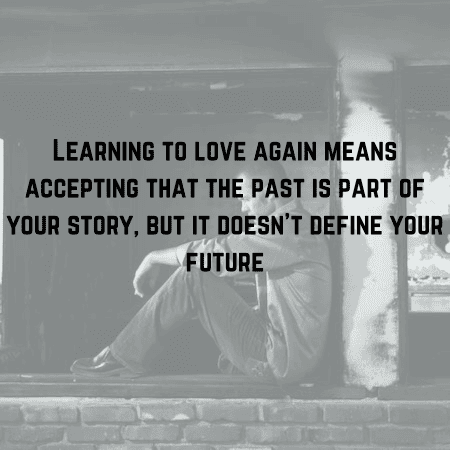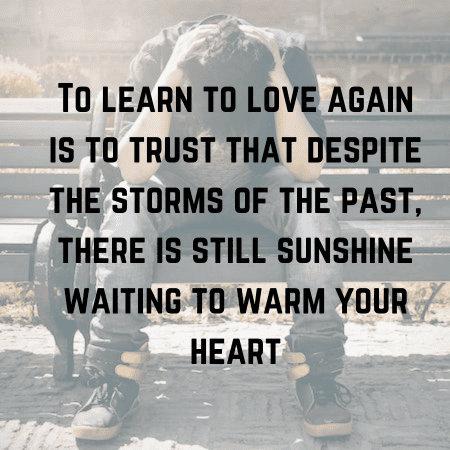Loving and being loved are some of our most profound experiences as humans. Yet, the journey to love can be fraught with challenges, especially after heartbreak. Learning to love again isn’t just about finding a new partner but healing and opening your heart despite past pains. This article will guide you through How to Learn to Love Again, focusing on healing, self-discovery, and gradually embracing the vulnerability of loving anew. So keep on reading…
Identifying emotional wounds
Identifying emotional wounds is critical to personal development and managing relationships within a business environment. Emotional wounds, often stemming from past experiences of rejection, failure, or betrayal, can significantly influence how individuals interact and communicate in a professional setting.
To identify emotional wounds, one can look for patterns in emotional responses that seem disproportionate to the current situation. These overreactions often signal unresolved issues. For instance, someone who experienced betrayal may have difficulty trusting colleagues, manifesting as resistance to collaborative projects or an overemphasis on controlling details.

Reflect and Accept
The first step in learning to love again is healing from past relationships. This involves deeply reflecting on what went wrong and what was learned from those experiences. It’s important to process and accept these feelings as part of your history.
- Reflect on past relationships: Consider what you appreciated about your past partners and what ultimately led to the relationships’ end.
- Accept your emotions: Allow yourself to feel sadness, anger, or disappointment. These emotions are natural, and acknowledging them is crucial for healing.
Seek Closure
Finding closure is a personal process and may involve different steps for different people.
- Write a letter: Sometimes, writing a letter you never send can help articulate feelings and grant emotional release.
- Talk to a therapist: Professional help can provide insights and coping strategies that friends or family might not offer.
Must Read
- How To Be More Feminine In A Relationship
- How to End an Emotional Affair and Still Be Friends
- What Do Intentions Mean In A Relationship? Explained

Rediscovering Yourself
Explore New Interests
After a significant breakup, you might find that your identity has been intertwined with your partner’s. Rediscover who you are on your own by exploring new hobbies, interests, and social circles.
- Try new activities: Join clubs or classes that interest you. This can be anything from cooking classes to hiking groups.
- Expand your social circle: Meeting new people can introduce different perspectives and experiences that enrich your life.
Cultivate Self-Love
Before you can love someone else fully, it’s essential to love yourself.
- Practice self-care: Regularly engage in activities that nurture your body, mind, and soul, such as yoga, reading, or meditation.
- Set personal goals: Achieving goals can boost your self-esteem and help you feel fulfilled independently.
Opening Your Heart Again
Start Slow
When you feel ready to explore romantic relationships again, take it slow. Rushing into something new can lead to comparisons with past relationships or ignoring red flags.
- Friendship first: Building friendships can provide a strong foundation for a romantic relationship.
- Set boundaries: Know your limits and communicate them clearly to potential partners.
Embrace Vulnerability
Being vulnerable is terrifying but essential for building deep connections.
- Share your feelings: Open up about your emotions, hopes, and fears. This can strengthen bonds and foster intimacy.
- Accept uncertainty: Love involves uncertainty. Embrace it as a part of the adventure, not something to fear.

Nurturing New Relationships
Communicate Openly
A good communication system is the foundation in any relationship that is healthy. Communicate your thoughts and feelings freely and encourage your partner to be the same.
- Engage in active listening: Show genuine interest in your partner’s language. Ask questions and think about the information you have heard to assure that you are able to comprehend.
- Be calm and peaceful in resolving conflicts: Address disagreements with patience and understanding, while seeking compromise.
Celebrate the Path
Every relationship is different and follows a specific path. Be grateful for the journey of creating an exciting new relationship with all its highs and downs.
- Take time to appreciate the moments: Cherish the small happy moments you share in the form of a laugh shared over a meal or walking through the parks.
- Grow with each other: Support each other’s changes and growth. It’s about building relationships and not just staying together.
Practicing Self-Love and Acceptance
Self-love is the basis to healthy and happy relationships. Be open to your imperfections and flaws accepting the fact that they make you unique and worthy of love. Develop a sense of self-worth and practice treating yourself with respect and love.
Building trust into relationships
Trust in new relationships is essential to establishing an enduring and healthy relationship with anyone. Trust is the base on the foundation of relationships; in the absence of trust, the bonds between people can be weak which is easily damaged. Here are some methods to establish trust in relationships that are new:
Transparent Communication Effective communication is crucial to creating trust. Be transparent and honest with your partner regarding your feelings, thoughts, and expectations. Encourage open discussion with active listening, to assure each party feels heard and respected.
Consistency Consistency in the use of actions and words helps establish credibility over time. Be trustworthy and keep your word on your promises. A consistent behavior shows honesty and reliability as important elements in gaining trust from others.
Respect Boundaries Respect the boundaries of your partner and be clear about your boundaries. Know that everyone has different tolerance levels and boundaries and it’s important to honor and respect them in order to build trust and respect.
Empathy Empathy is the capacity to comprehend and understand other people’s emotions. Empathize with your loved ones by being supportive, understanding and sensitive to their emotions and experiences. The act of confirming their feelings can enhance the emotional bond and builds trust.
Be vulnerable Building trust requires vulnerability and honesty. Share your thoughts, feelings and weaknesses with your partner and benefit them share the same. Being vulnerable can lead to more intimate emotional bonds and builds intimacy and trust.
Let go of the old hurts and anger
The release of past hurt and resentment is vital to getting forward and creating healthy relationships. Here are two actions to assist in this process:
Forgiveness and closure Forgiveness is a powerful method of releasing negative emotions and liberating oneself of resentment. It requires getting rid of the sting, anger, and the need to take revenge on those who have injured us. When we forgive others it allows them to release the emotional burden they have placed on us and allow to heal and grow. Also, closure is important because it helps us procure satisfaction and closure regarding our past experiences. This could mean talking to the person we hurt writing a letter to express your feelings or declaring that we are willing to go on.
Moving forward through the benefit of a Clean Slate: Once we’ve gotten over our hurts and have achieved closure, we need to release the burden of our past, and accept the present with an uncluttered slate. This involves letting go of any emotional attachment to the past and allowing ourselves to begin new.
instead of getting caught up in your past complaints, concentrate on the opportunities and possibilities that lie ahead. Learn from your past However, don’t let them define you or limit your possibilities for the future. When you approach your life with an open mind and a fresh approach it will create the space needed for joy, love, and positive energy to grow.
Conclusion
Learning the art of loving again following heartbreak can be a challenging and rewarding experience. It is about recovery, self-discovery, as well as the willingness to share your vulnerability to a new person. Just taking each step one at a moment and accepting the process will allow you to open your heart to the wonder of new beginnings. Remember, every step forward is a step toward a new possibility of love.